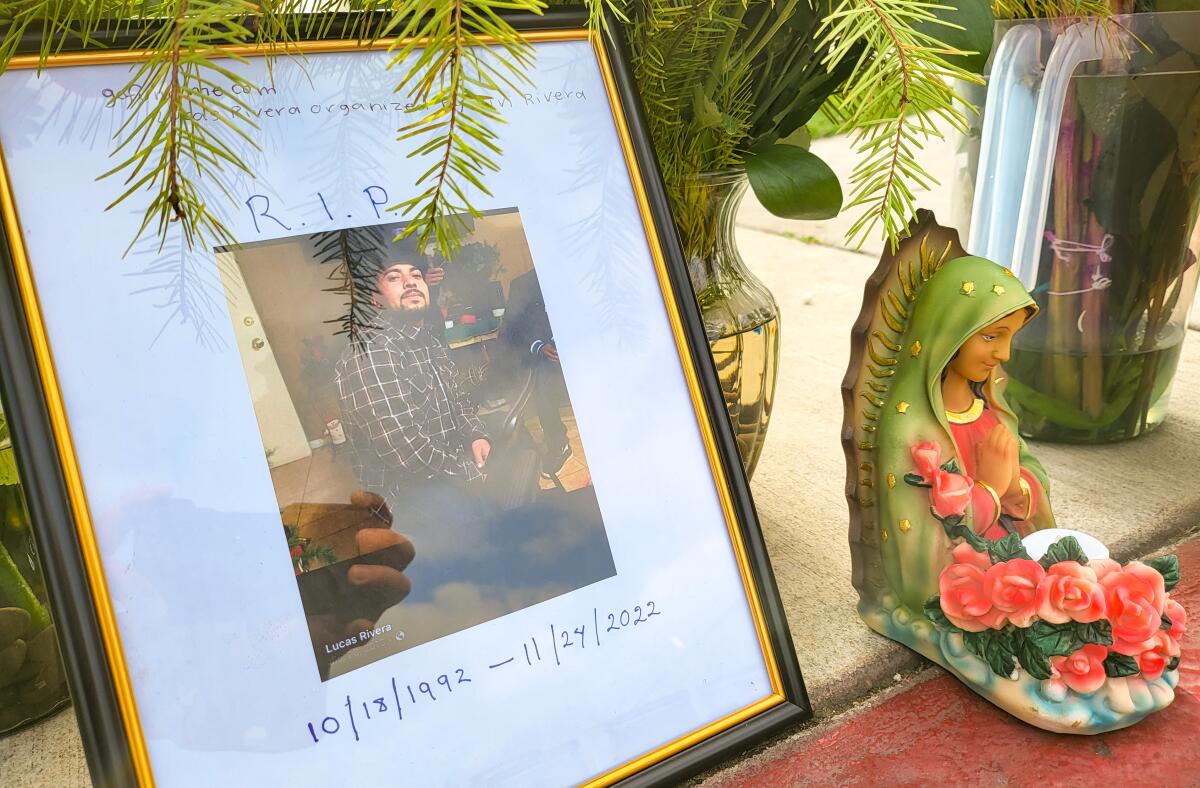Jury begins deliberating case of Thanksgiving shooting in Costa Mesa

- Share via
Jurors began deliberating Tuesday to decide whether a man facing charges of murder and attempted murder acted in self-defense when he opened fire on the occupants of a truck after a minor traffic collision in Costa Mesa last Thanksgiving, or if he was the aggressor and sought out confrontation with the victims, as prosecutors allege.
Lee Q. Walker had driven to three closed McDonald’s restaurants in search of fast food for his 4-year-old son when the side view mirror of his truck was grazed by another occupied by six men near 19th Street and Harbor Boulevard. The defendant got out of his car at a stoplight to contact them, but the signal turned green so they drove off.
Walker followed the victims about a mile north in spite of protest from his son and girlfriend, Denise Segura, according to her testimony. He got out and approached them a second time as they were dropping off one of their companions in front of 432 W. Bay St. at 6:50 p.m. Nov. 24.
Moments later he opened fire while standing near the rear passenger side of the victims’ truck, then walked up to the open doors of the vehicle’s cabin and shot several more times, as seen in surveillance footage played during trial. On his way back to his truck, Walker discharged one more round into the head of 30-year-old Lucas Rivera-Velasco as he was lying wounded on the ground, killing him.
The defendant said he was only trying to exchange insurance information, and testified that he saw two handguns in the victims’ vehicle when he first tried to talk to them. He claimed that’s the reason he took a 9mm handgun from his center console before trying to talk to them a second time.
“He pulled the slide and racked a round because he had already decided ‘this is how it’s going down; they are going to pay,‘” Orange County Senior Deputy Dist. Atty. Dan Feldman said during closing statements Monday.
Walker testified that he heard someone cuss, drawing his attention to the passenger side of their truck. He claimed one of the men who had been inside was within arm’s reach by the time the first shots were fired moments later.
Rivera-Velasco “was coming toward him,” Walker’s attorney, Randall Bethune of the Orange County Public Defender’s Office argued. “That is when he used force and that is reasonable. [Another man] was right behind him. Is he supposed to wait till he’s attacked? If your wife and child are in the truck why would you want to wait till they come to you?’’
Costa Mesa Police Det. Erick Fricke was the detective who interviewed Walker when he turned himself in the day after the shooting. The officer acknowledged that one of the people who was shot can be seen taking two steps toward the defendant in one of two videos recorded at the scene.
However, Fricke described that victim’s motions as “insignificant” compared to the path Walker took. The defendant appeared to jog from the driver side of his vehicle over to the rear passenger side of the truck bed parked in front of him as two men were getting out of the cabin.
“He didn’t walk,” Feldman said. “He ran to confront them.”
Fricke also testified the defendant never mentioned seeing guns in the victims’ truck when they spoke upon his arrest. And even if he had, Feldman argued that wouldn’t justify his decision to shoot the men.
Walker could have reported the accident and let the victims drive off if he thought they were armed and a possible threat, but he chose to pursue them instead, Feldman pointed out. If that were the case, the defendant himself could have been potentially placing his family in danger by following a stranger’s vehicle down a dark side street, then leaving them unattended as he got out.
“He put himself there,” Feldman said. “He created a situation with an excuse to use force.”
Bethune acknowledged that his client could have stopped following the pickup truck. But “that is not the legal standard,” and from the defendant’s perspective he was the victim of a collision attempting to get a hold of a fleeing suspect, the defense attorney said.
“That does not address the issue of whether he was justified,” Bethune said. “He didn’t know it was minor damage. He told them you hit my car. They chose to ignore him. They look at him and keep going. From his perspective, the right thing to do is to talk about this ... Objectively, they are not following the law.”
Walker’s defense also suggested statements made by police illustrated a bias toward convicting his defendant that may have tainted the information they were given by witnesses. Bethune noted Fricke was dismissive of his client’s claims of self-defense, and when the two of them reviewed footage the detective changed the subject when Walker tried to point out the moment he claimed one of the wounded men shouted at him, causing him to feel threatened.
Bethune brought forth excerpts of transcripts in which Costa Mesa Police Det. Joe Lopez told one of the victims “what we don’t want is for the guy to say he was defending himself” prior to conducting a recorded interview.
Lopez testified he was not attempting to solicit inaccurate information, and that it is not uncommon for police and district attorney’s officials to collaborate and be mindful of each other’s roles as they follow up on a case. Another Costa Mesa police detective, Ramon Hernandez, made similar comments before speaking with another victim in the Thanksgiving shooting.
“Only asking for information that could eliminate self-defense, that could affect what he tells you?” Bethune asked Hernandez during trial.
“Possibly,” he replied.
Feldman pointed to the victims’ own testimony in challenging his assertion of self-defense.
“He told you it was his right to follow them and ‘stand his ground,’” the prosecutor told jurors Monday. “Let that sink in for a second. He testified: I followed them, ran over there, and stood my ground.”
Paul Anderson of City News Service contributed to this report.
All the latest on Orange County from Orange County.
Get our free TimesOC newsletter.
You may occasionally receive promotional content from the Daily Pilot.




